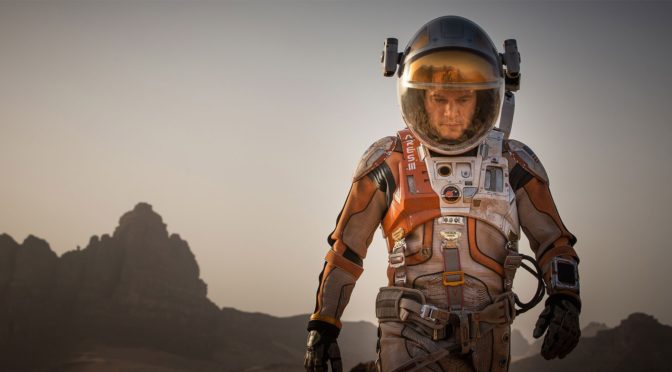Ken Piper, July 23, 2016
I recently saw the movie The Martian for the second time. It is one of my favorite science fiction movies. I emphasize “science” because sci-fi covers a wide span, from mostly fiction with little or no science to mostly science with some scientific oversights in order to be more engaging. This one falls into that latter group. Yes, I know the Martian atmosphere is too thin to generate a storm like in the movie. And, there are lots of other things to nitpick about, if that is your desire. The story has a nice mix of humor and suspense that makes it fun to watch. But its importance may be in its possible effect on U.S. space policy.
I read an opinion that it is the biggest boost NASA has gotten in decades. The movie has brought to the world’s attention that we still have not gotten to Mars. The movie 2001 (1968) envisioned a lunar base and a manned mission to Jupiter. At that time, the space program was still in fast track mode, in order to get to the Moon before the end of the decade. Since that time, NASA has been low on our list of priorities, an especially easy target for cost cutting.
But the Moon program was during Johnson’s Great Society and the war in Viet Nam. Somehow we found the money to do it, and, it can be argued that the technological advances were worth the cost.
The writers of Martian were clever in their inclusion of China as a partner in the rescue attempt. And, in fact, one of the astronauts in the follow-up mission Ares 5 looks like he could be Chinese. As is the case with the International Space Station, international cooperation helps with the cost and has the added benefit of fostering cooperation among nations. A mission to Mars would be much more costly, and, wouldn’t it be nice if the nation with the second-highest GDP was a part of the team?
Now, if we could just get Congress to stop doling out the goodies to buy everybody’s votes, maybe we could afford to support a real space program.
Image: Fox Movies, via Google Images


I am with you Ken – all the way!!
I loved this movie too! I have wanted to live and work on Mars since I was a young teen and discovered the National Space Society.
If you liked this movie, you’ll love Robert Zubrin. He wrote a number of excellent and densely-researched books about the importance of Mars to our human future. His flagship work (in my opinion) is The Case for Mars: The Plan to Settle the Red Planet, and Why We Must.
Zubrin also has a hilarious YA fiction adaptation of it, which is half the size and conveys substantive science, self-preservation, and policy in a breezy and entertaining way: How To Live on Mars: A Trusty Guidebook to Surviving and Thriving on the Red Planet (written from the perspective of a savvy and iconoclastic Martian prospector in the not-too-distant future: all the tech is present-day or older).
Here’s a link: https://www.amazon.com/Case-Mars-Plan-Settle-Planet/dp/145160811X/ref=sr_1_1?ie=UTF8&qid=1470872334&sr=8-1&keywords=Robert+Zubrin
…and…
https://www.amazon.com/How-Live-Mars-Guidebook-Surviving/dp/0307407187/ref=pd_sim_14_2?ie=UTF8&dpID=51iMeDBmbyL&dpSrc=sims&preST=_AC_UL160_SR104%2C160_&psc=1&refRID=9DZYHMY2949XN6ZWD0H6
Thanks for commenting, Nicolas. If the second book is at all like the Hitchhikers Guide to the Galaxy, it should be an entertaining read.
Actually, I think we need to plan for a future here on Earth. First and foremost, then, is limiting our population. Mars has several big problems to settlement. Among them are lack of water, lack of a sufficiently dense and oxygenated atmosphere, and gravity. There is a new movie that is coming out in a few months that speaks to that last problem. It is about a boy who is born on Mars, and grows up there. He wants to come to Earth, but having grown up in a low-gravity environment, he can not stay indefinitely. Like “The Martian” there are certainly a lot of mistakes on the science, but the problem is still there.
If people are to be able to travel back and forth on a regular basis, we need to get there much faster, and safely. I may be around when people first travel there, but don’t expect settlement in the forseeable future. We may see the beginnings of renewed continental glaciation first.